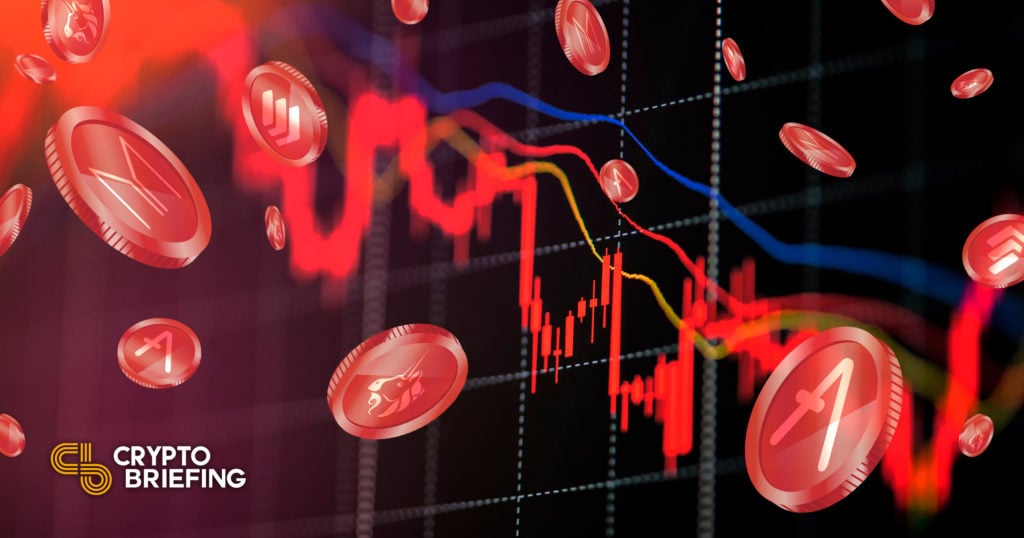
Shutterstock covers by Kobee and Poring Studio (edited by Mariia Kozyr)
One Year Later, DeFi Bear Market Shows No End in Sight
While global equities entered a bear market in 2022, crypto's DeFi sector has been bleeding for over a year.
Due to shaky macroeconomic conditions accelerated by Russia’s Ukraine invasion in February, risk-on like equities and crypto have trended down throughout 2022. However, one crypto niche has suffered for longer than the rest of the market: DeFi tokens.
Ethereum DeFi Slump Continues
Although DeFi has offered clear product-market fit and relatively strong fundamentals, many of the space’s top assets have been trading in a bear market for over a year.
The governance tokens of some of crypto’s most popular DeFi protocols, including MakerDAO, Aave, Uniswap, and Compound, have plunged between 80% to 92.5% in value from their all-time high prices recorded in May 2021. Aside from the overall bleak conditions permeating nearly all markets this year, with the Nasdaq suffering a 27% drawdown, and Bitcoin bleeding 57.5%, DeFi has been hit far harder than most other crypto assets.
MakerDAO, the protocol behind the popular decentralized DAI stablecoin, has seen its MKR token fall to around $1,300, down over 79% from its May 2021 all-time high price of $6,292. That puts its market cap at $1.1 billion, short of DAI’s $6.8 billion. Interestingly, Maker’s fundamentals have improved over the past year despite MKR’s weak price performance. DAI’s market cap has grown by around 40%, indicating that it still has utility within the DeFi ecosystem. DAI recently reclaimed its spot as crypto’s top decentralized stablecoin following the collapse of Terra’s UST, weeks after Terra’s Do Kwon had pledged to kill DAI. And while the protocol’s revenues have not caught up to last year’s highs, Maker has averaged around $7.2 billion in monthly revenues year-to-date, a slight decrease on its 2021 monthly average of around $7.41 billion. The Ethereum-based project is also set to expand to StarkNet this year, meaning users will be able to access it at a lower cost on Layer 2.
Aave, the largest money market protocol in DeFi, is also in a slump. Its AAVE token is currently changing hands for around $98, down roughly 85% from its May 2021 all-time high price of $661 despite arguably improving fundamentals. Per data from Defi Llama, Aave held around $11.8 billion in total value locked in the lead-up to UST’s collapse, roughly the same amount of liquidity it held this time last year (Terra’s wipeout extended to the DeFi space as users rushed to exit the ecosystem, draining liquidity from Aave and other protocols). According to data from Token Terminal, Aave’s price-to-sales ratio has decreased from around 19.8x to 8.38x, indicating that the AAVE token has gained in intrinsic value. Aave recently launched a V3 update with cross-chain functionality across Ethereum Layer 2 and other networks, but that did little to help AAVE gain momentum.
Crypto’s largest decentralized exchange, Uniswap, has also had a rocky year in price performance terms. UNI, Uniswap’s governance token initially given away to early users following a “vampire attack” from Sushi, is currently trading for around $5.60 per token, down 87.4% from its May 2021 high of $44.92. In terms of fundamentals, however, Uniswap has not experienced a huge drawdown. Before Terra’s collapse, the total value locked across all liquidity pairs on the platform was around $7.8 billion, or only slightly down from its all-time high total value locked of about $10.3 billion. In trading volume, meanwhile, Uniswap currently boasts an average monthly trading volume of around $46 billion. In May 2021, Uniswap was handling about $31 billion. Nonetheless, UNI has bled since.
Compound, another lending protocol that’s sometimes described as an Aave competitor, has suffered the worst among the top four projects in price terms. Compound’s COMP token is currently changing hands for $68.50, 92.5% down from its May 2021 high of $910. However, it’s worth noting that Compound’s fundamentals have arguably weakened over the past year. The money market has seen a drawdown across all key metrics, including total value locked, total revenue, and price-to-sales ratio.
DeFi had an auspicious run in the summer of 2020, giving rise to the advent of yield farming and a heady period of trading activity that became known as “DeFi summer.” It also outperformed relative to the broader market in early 2021, but the sector has endured a brutal winter phase since the May 2021 crypro crash. Priced in Bitcoin and Ethereum terms, the returns for DeFi projects are even worse. As other crypto sectors like NFTs and “alternative Layer 1” gained steam in the second half of 2021, DeFi’s price performance has been weak relative to the rest of the market. Now that the entire space is suffering, the DeFi drawdown is showing no sign of a turnaround.
Disclosure: At the time of writing, the author of this piece owned ETH, xSUSHI, and several other cryptocurrencies.
